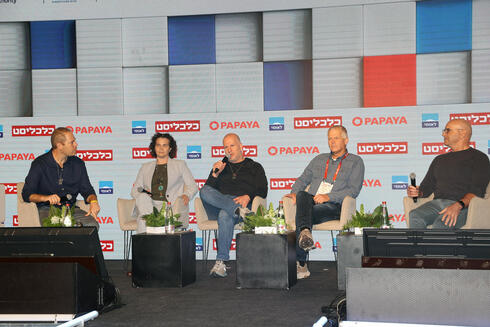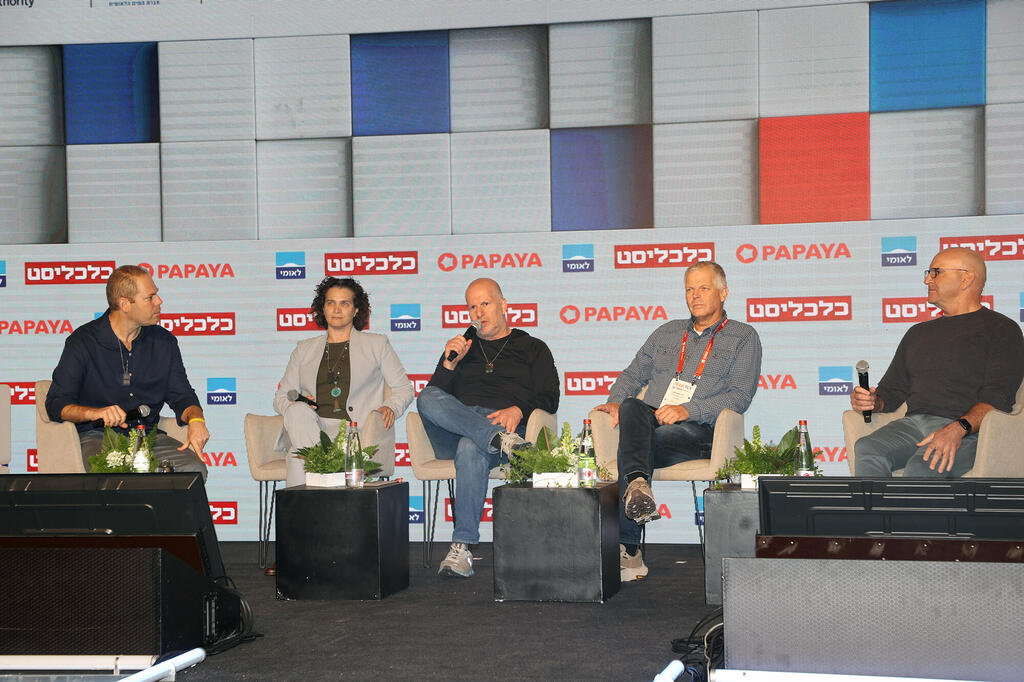
Tech TLV
"High-tech must mobilize and be part of the rehabilitation of Israel"
Tal Barnoach, General Partner of Disruptive VC, said during Calcalist's Tech TLV conference that the current situation provides a huge opportunity for the growth of startups throughout the country; Gil Shwarsman, who operates a technology incubator in the south, said that "no company has left or announced that it is leaving"
"We realized that the entire State of Israel is a home front. The greater the failure of the government, the more we in high-tech realized that we must mobilize and must be part of the rehabilitation, to repair and help," said Tal Barnoach, General Partner of Disruptive VC, speaking in a panel moderated by Amir Kurtz as part of Calcalist's Tech TLV conference held in collaboration with Bank Leumi and PAPAYA.
"I think there is now a huge opportunity here. I travel endlessly throughout the country, from Ashkelon to Kiryat Shmona, and I talk to people about high-tech activities and how we can bring companies there and grow more startups throughout the country. This is one of the most important challenges, and if we succeed and are able to build a system that will allow high-tech companies to be active both along the Gaza border towns and in the north, there is a very big opportunity here," he said.
When asked what their situation was on October 7th, Prof. Karine Nahon, head of the Data, Governance and Democracy Department at Reichman University, replied that "If there had been no protest, there would have been no civil aid. There was no infrastructure in place on Sunday October 8th, when we realized that there were thousands of people waiting to be rescued, dozens of people who we knew at the time were kidnapped. We didn't understand the numbers at all and then we realized that the list had to be produced and the challenge was to understand who was in the south that day.
"We put out a call in the protest groups and thousands of volunteers came. Technology helped us understand where there are missing persons, we worked with the Shin Bet, with Israeli Intelligence, missing persons rescue department, Lahav 433 (the Israeli crime-fighting umbrella organization within the Israel Police), everyone, we worked against the clock using technologies that locate places in the area to think where people were hiding, using voice recognition, facial recognition, all the technologies that allow us to find another injured person, another living person."
Yiftach Shoolman, the Co-Founder and CTO of Redis and a partner in the project to document and archive the horrors of October 7, said that "On October 7, for the first time, the State of Israel found a smart enemy in front of it. It was not unlike any war in Israel. How can it be that this smart enemy allows all the horrors to be seen on social media. We understood that all the horror films and images should be downloaded because as soon as their leaders realize what is happening they will take it off the web. It was a shocking project on a personal level, but in the end I think we did well in terms of documentation and also in terms of world diplomacy."
Gil Shwarsman, CEO of SouthUp, stopped a group of terrorists with his personal weapon on October 7 together with the standby squadron at the gate of the kibbutz where he lives. "I have a technology incubator with 26 startups and we had to think about how they will continue to work, where they will move to, 80% of the workers in the incubators are from the area. Startups moved in their entirety to the area to which they were evacuated. No company has left or announced that it is leaving," he said.
"The mobilization of the high-tech and the Brothers in Arms group was quick when we realized that there was a mega event happening here and we realized that we needed to take care of a number of things and that the government was not there," added Barnoach. "It started with things related to equipping the army, technological projects, and high-tech companies that were involved. Platforms that would sit on Monday.com, Fiver’s emergency command center, a lot of Wix projects, a headquarters that was connected to several companies that would connect together. There were over 3,000 people rescued from the Gaza border towns, an emergency shelter that was established to meet the needs of the residents, people who left their homes with nothing and needed basic supplies. The government was not in the picture. We thought we would take the lead and as soon as the government is ready - it takes over."
Regarding the day after the war, Nahon said that the high-tech industry will not return to sitting on the fence. "Something happened this year. The high-tech industry rolled up its sleeves and started to be involved in civil society. Beyond just employment or another startup here or there, but at the level of values. How do we bring back the values of Zionism. Looking ahead a year or two, once the high-tech industry has now come down from the fence it sat on all these years, it will not return to the fence. What happened on the seventh of October is a punch in the stomach for all of us, and certainly for the people of the Gaza border towns. If we don't understand how to strengthen the resilience, to create the ability to quickly recover, if residents do not feel confident that they can return to the north and south - there will be no revival."
According to Shwarsman, a death toll ratio of one to twenty will not help national resilience. "The only way to overcome this is through technology. I have heard quite a few entrepreneurs who are working so that within two or three years we can create a deterrent advantage here that will last for generations. For this to happen, high-tech people need to enter the public systems. We need an ecosystem of startups, funds to invest in technology from the pension funds that will create this deterrence and oblige the IDF to purchase from them."
Baranoach concluded by saying that "we all understand that the citizens of this country are amazing people who are much better and more worthy than their leaders, so we must mobilize to create a much better reality for the State of Israel."














